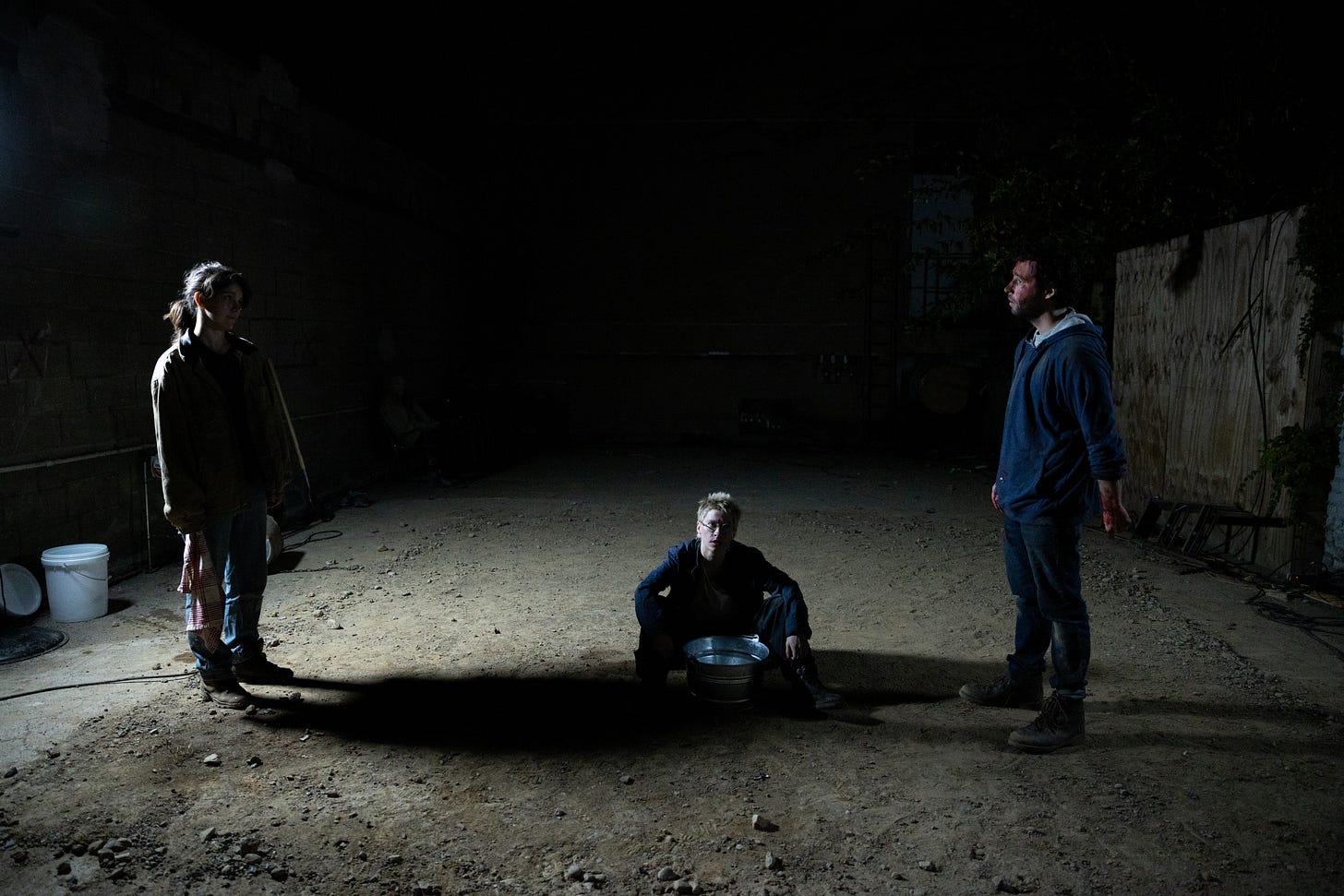Lost in the Wilderness, On An Abandoned Lot in Queens
Silencio Theatre Projects gives UK playwright Simon Longman’s ‘Gundog’ an unlikely US premiere
A large concrete lot is the venue for Silencio Theatre Projects’ chilling and mostly successful New York debut, a production of English playwright Simon Longman’s Gundog staged on an abandoned lot in Queens.
Gundog had its world premiere at London’s Royal Court back in 2018, but Silencio’s ramshackle staging is the writer’s first New York production. No shock that this particular play didn’t immediately move—it is super Royal Court-ey, with a sad, crumbling family of English farmers lost in a metaphorical wilderness and confused by a changing country leaving them behind.
But here, in director Michael Rogerson’s hands, Gundog is less specific to its rural English setting. It becomes a more universal tale of isolation, purposelessness and the alluring trap of dying family traditions.
On a farm in the middle of nowhere, sisters Becky (Emily Ashenden) and Anna (Sophie Neff) come across a mysterious stranger (Daniel Chenard), who claims his name is ‘Guy Tree.’ The three soon fall into collective survival routines, stealing, raising and slaughtering lambs. Flashbacks reveal how Becky and Anna reached this point, after their (unseen) father’s death, grandfather Mick’s (Michael Bracken) gradual mental decline, and their brother’s abandonment. But when that brother, Ben (Noah Yaconelli), returns to the farm, he grows suspicious of Guy. Meanwhile all four begin to lose track of time as the years slip by.
Silencio’s atmospheric production is textbook ‘Doing a lot with a little.’ Abandoned lots in New York can often feel creepy (especially in otherwise developed areas), and with some added mud and dirt designer Miles Blim turns this barren space into something dystopian. Lighting designer Zack Lobel does wonders with a few floodlights—an unsettling repeating cue that suggests years slipping away is especially impressive. The farm’s animals, including an increasingly decrepit dog, are built by Gaby FeBland out of cold, industrial objects—a ladder, a piece of pipe—emphasizing the characters’ disconnection from what little natural life still draws breath around them.
Even the inevitable disruptions of the city (helicopters, drunk yelling, some 9pm drilling) here felt oddly appropriate, though the play is ostensibly set in the middle of nowhere. Life buzzing around us here felt representative of all these characters had forgotten: connection to a society, to some ecosystem of existence other than routines of death and decay.
For all the ingenuity of Rogerson and his team, Longman’s very English play is still an odd match for an outdoor staging in Queens. Some sections feel strained. The flashbacks have a pleasingly melancholy wit when focused on grandad Mick, who repeatedly tells the same anecdote (albeit with sometimes horrifying variations) as his mind goes; but Ben’s descent into despair is more rote, and his later conflict with Guy feels drawn-out.
Though Rogerson deemphasizes the English milieu, his actors are still saddled with challenging accents that often feel distracting. The performances are nonetheless strong, if sometimes so quiet and internal that they feel at odds with an outdoor staging battling the elements.
Bracken is heartbreaking as Mick, but sometimes inaudible (perhaps deliberately, as it feels like the character is receding from existence before our eyes); Ashenden is a welcome spark-plug of energy at the play’s start, but then grows flatter—again, maybe a choice reflecting Becky’s increased disassociation, but one that robs the evening of some much needed spark.
So why do Gundog? Besides its setting making a great fit for this sad little lot, which it does, it’s the timely theme of breaking free from passed-down traditions which no longer guarantee survival. In the final scene, Guy speaks lovingly of the value he has found in isolation. But Becky questions that solitude, reminding him that there is more out there. And the production itself is a riposte to Guy’s fatalism: strangers gathering, with common purpose, in an unlikely corner of the city, seeking some semblance of shared communion.






